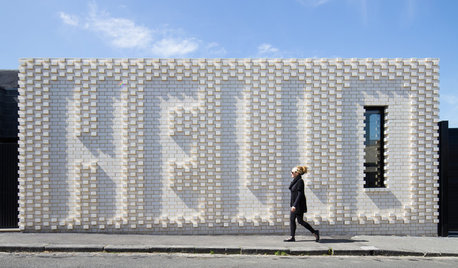decluttering, in the Wall Street Journal
talley_sue_nyc
15 years ago
Related Stories

DECLUTTERINGDecluttering — Don't Let Fear Hold You Back
Sure, you might make a mistake when tackling a decluttering project, but that's OK. Here's why
Full Story
ORGANIZINGYour Total Home Organizing and Decluttering Guide
Take it slow or be a speed demon — this room-by-room approach to organizing and storage will get your home in shape no matter how you roll
Full Story
GARDENING AND LANDSCAPINGPotted Plants Perk Up the Streets of Coastal France
Dotting a stairway or perched on a café table, plants in colorful pots and vibrant flowers make a picturesque scene in a town on the coast
Full Story
DECORATING GUIDESEdit Keepsakes With Confidence — What to Let Go and What to Keep
If mementos are weighing you down more than bringing you joy, here's how to lighten your load with no regrets
Full Story
MOST POPULAR10 Strategies for Keeping Surfaces Clutter-Free
The universe wants your coffee table to become a clutter magnet — but you can fight back
Full Story
DECLUTTERINGDecorate with Intention: Clutter Clearing 101
Fearlessly face disorganized areas to find the home of your dreams
Full Story
LIFE10 Steps for Saying Goodbye to Sentimental Objects
Are keepsakes cluttering your space and your life? Consider this approach for letting go and moving on
Full Story
LIFEStop the Toy Takeover by Changing the Way You Think
Make over your approach and get gift givers onboard with your decluttering efforts by providing meaningful toy alternatives
Full Story
CONTEMPORARY HOMESHouzz Tour: A Creative Renovation Says Hello
A bland brick expanse at the street side of a corner house has become a very cool local landmark. All it took was a simple thought
Full Story
COMMUNITYWant a Cleaner, Safer Neighborhood? Show You Care
Our behavior strongly influences others, says a new study. Show neighbors you care about your street and watch them follow suit
Full Story








socks
sue36
Related Professionals
El Segundo Custom Closet Designers · Mount Laurel Interior Designers & Decorators · Broadlands Home Builders · Carnot-Moon Home Builders · Montgomery County Home Builders · North Richland Hills Home Builders · Orange City Home Builders · Saint Peters Home Builders · Seymour Home Builders · Warrensville Heights Home Builders · Maryland Carpenters · Ossining Carpenters · Pickerington Carpenters · Piedmont Carpenters · Tonawanda Carpenterstalley_sue_nycOriginal Author
maryliz
dilly_dally
kec01
maryliz
western_pa_luann
talley_sue_nycOriginal Author
maryliz